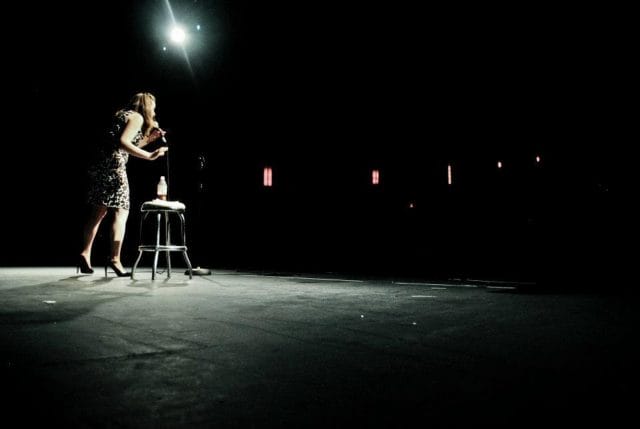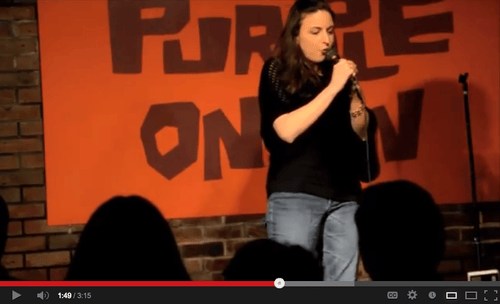Stand-up comedy is perhaps the most difficult form of public speaking. In normal public speaking, if you give a speech that’s not well received, the audience will just stop paying attention. Stand-up comedians stand on stage telling jokes. When their punch lines fall flat, everyone knows right away. No one laughs and the room is filled with a palpable, awkward silence. Sometimes a member of the audience yells at the comedian “You suck!” This is called heckling and is generally considered acceptable behavior by the audience.
You have to be fairly brave, confident, or deluded to start performing stand-up comedy. But what if you stuttered? What if your entire life, teachers, classmates, and strangers grimaced when you spoke? Even if your dream was to be a stand-up comic, would you pursue it?
Nina G stutters and she’s a pretty darn good stand-up comedian in San Francisco. She is fearless on stage, rattling off clever jokes, bantering with the audience, and all the while stuttering and pausing without a hint of self-consciousness. When we saw Nina G perform, we asked ourselves, “Who is this person?” Did she not get teased and bullied as a kid? Did she not struggle with public speaking when she was younger? How did she come to embrace the ruthless world of stand-up comedy?
You can see from this clip that Nina is both very funny and comfortable on stage. For those of you unfamiliar with stuttering, you can also see that yes, Nina stutters while on stage (warning: language NSFW).
In software, there is an expression that goes “That’s not a bug. That’s a feature.” When the iPhone was released, for example, Steve Jobs famously argued that its lack of Flash video support was a feature that meant longer battery-life and fewer device crashes. A less optimistic person might have called it a bug, since most of the web’s videos were in that format at the time.
Nina embraced a neurological condition and completely owned it as part of her comedy product. She took what some might call a limitation (stuttering) and is trying to build a comedy career around it. We think that’s pretty neat, so wanted to find out more after seeing her perform.
This is the story of Nina G, the world’s only female stand-up comedian that stutters.
What It’s like to Stutter as a Kid

When you see Nina perform onstage, she exudes self-confidence. That wasn’t always the case. Nina wanted to be a stand-up comedian ever since she was a little kid, but didn’t work up the nerve to do it until her mid-thirties.
I wanted to be a comedian since I was 11 years old but I didn’t really think of it seriously since I stuttered and that wasn’t something that comedians did. I remember from being a little kid just loving comedy. Steve Martin, Saturday Night Live, I loved it.
Anytime I had to do a book report, it was about comedy. In college, whenever I could, I’d write papers analyzing stand-up comedians and their impact. Whenever I had free time as an adult, I’d go watch live comedy. I always just loved comedy.
Nina grew up in Alameda, California, a suburb of San Francisco. When she was eight years old, she started stuttering. Around the same time, she was diagnosed with a learning disability. Compared to her learning disability, stuttering actually wasn’t a big deal:
Going to Catholic school with a learning disability was the big problem. The school was so set in its ways they wouldn’t do anything to accommodate me unless my parents fought for it.
When I started stuttering at the age of 8, it was no big deal for my parents. My Dad had a hearing impairment; my Mom’s mom had polio. This was just something that happened, part of life. They were always really supportive.
Nina’s parents didn’t think of her stuttering as something that needed to be fixed. It was just a part of life. Nina’s childhood speech therapist was also a great source of support, helping her learn how to communicate more effectively without treating stuttering as something wrong with Nina.
Four percent of children stutter but only one percent of adults stutter. For some people, stuttering goes away as they get older. Others have it for life. Many fall on a continuum in between.
Nina recalls the first time she stuttered in front of a large public audience and what the consequences of that experience were:
I remember in 7th grade I was in the student government, and during the ‘inauguration’ you had to say your name in front of the whole school. I practiced and practiced so I could say my name without stuttering. But then, on the day of the inauguration, I couldn’t say my name. I just stuttered in front of the whole school instead of saying my name. Afterwards, I was sure everyone would be laughing at me.
But you know what? People didn’t laugh at me. Afterwards a girl came up to me and said “Nice job Nina.” I thought at first she was being sarcastic, but then I realized she really meant it.
There was one exception. Right afterwards, I was hanging out with a friend of mine, this 8th grader. A second grade boy came up to me and said “Hi n-n-n-n-Nina.”
My friend the 8th grader got down on one knee to look the 2nd grader in the eye and told him “If you ever say that again, I’m going to tell the whole school you have a tiny [redacted].”
To Nina, the consequences of stuttering in front of the entire school were relatively minor. People didn’t seem to mind. Instead, she found that having an “advocate” that “had her back” was extremely valuable, whether that advocate was fluent or stuttered. Sometimes when you have a disability, you just need someone to defend you, even if that means berating a second-grader.
Howard Stern As Disability Advocate
As Nina became a teenager, she recognized stuttering as part of her life. We were surprised to learn that she credited The Howard Stern Show as playing an important role in her coming to accept her stuttering.
For Nina, The Howard Stern show was the first time she saw someone in the media “stutter openly.”
Howard Stern was the only show I ever watched where one of the main characters stuttered. Stuttering John was a part of the show. They made fun of him like everyone else and he wasn’t treated any differently on the show because he stuttered. He was the first person I ever saw on TV that was just stuttering openly.
Stuttering John would go around interviewing celebrities and it was be really interesting to see how people reacted to him. I was fascinated by what assholes people were. Chevy Chase once told him, ‘Maybe if someone hit you, you’d stop stuttering.’ I still hate Chevy Chase because of that.
Nina wanted to be a comedian since she was 11, but she didn’t regard it as a realistic goal. Comedy and television were places for people that spoke fluently, not for someone like her:
I didn’t think I could be a comedian because I stuttered. There was no one on TV that stuttered unless it was a “very special episode” with a character that had a problem because they stuttered.
You just get the message that comedy is not the place for you. TV was a place for fluent people.
Instead, Nina focused her energy on being an advocate for disability rights. Nina remembers what it was like growing up and the issues she encountered because of her disability:
It’s the teachers who treated me badly that I blame because they had the power. I did a presentation with a friend in school and my friend got an A and I got an A- because I ‘didn’t speak clearly.’ Of course I didn’t speak clearly. I stutter, you [redacted]!
She went to community college and then transferred to Berkeley. She later earned a graduate degree and became a full time advocate for people with disabilities. For the next decade, she spread the message that those with disabilities are okay the way they are and that it’s society that needs to fix itself by better accommodating those with disabilities.
Hitting Middle Age Without Giving Your Dream a Try
Nina entered her mid-thirties having simultaneously accomplished a lot and not enough. On one hand, she had a successful career advocating for individuals with disabilities. At the same time, she still dreamed of being a comedian, and had never given that dream a shot since she stuttered.
Nina thought of herself as “doing pretty well for someone with a disability.” She still let her stuttering define her. She would speak up less often than she’d like so she wouldn’t subject others to her stutter and generally be more meek than she ought to be:
I was comfortable in my own skin, but I still let my disability limit me. Like I wouldn’t talk as much as I would otherwise so I wouldn’t make other people uncomfortable. I would be in relationships that weren’t always good for me because of self esteem issues I carried around from stuttering and my learning disability. I was in a state like, ‘I’m doing pretty well in life for someone with a disability,’ but I was still letting my issues around my disabilities limit me.
Everything changed in 2008 when Nina attended the annual conference for the National Stuttering Association, which she hadn’t attended since she was a teenager. Nina credits attending this conference as being a turning point for her life.
2008 was the year when I changed and completely owned who I was. I went to the Stuttering Conference. I hadn’t been since I was 19 years old.
Being around all these people that stuttered, I realized how differently I was acting back at home. I was afraid of “taking up too much space” by subjecting people to hearing me talk. I was being meek and small, and I didn’t realize it until I was around all these other people who stuttered and I was able to be myself.
It was a four-day conference, but by the end I was changed.
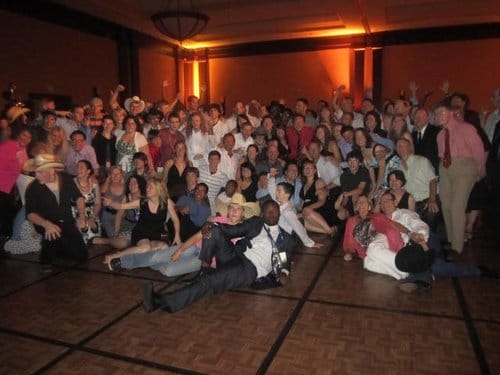
When Nina came home from the conference, she immediately severed relationships with the people in her life whose behavior contributed to Nina thinking less of herself because she had a disability.
She also decided that stuttering would no longer be an excuse to not pursue her dream of stand-up comedy. Right after the conference, she enrolled in a stand-up comedy class and was on her way to giving her dream a try.
How to Make it in Stand-Up Comedy
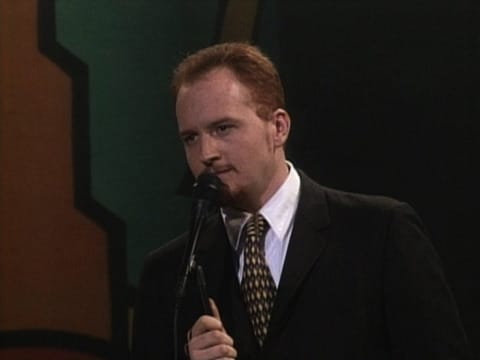
The odds of “making it” in the stand-up comedy circuit are slim. From chatting with San Francisco comedians, the last household name they can point to that emerged from the local comedy scene was Dana Carvey, and that was two decades ago. It’s not only difficult to become famous, it’s nearly impossible to make a living wage.
Almost all stand-up comics start their careers by going to “open mics.” Anyone can perform, but audiences are generally small. Open mics are a good way for stand-up comedians to get stage time and improve. Of course, you don’t get paid for performing at open mics.
The next step up from open mics is getting paid about $10-$50 to do a short set (5-10 minutes) at an event put on by a promoter. Promoters rent out a venue and sell tickets to the show. Comics that build enough relationships and work at it for a decade can sometimes string together enough of these paying shows to earn a living wage. Most don’t. Occasionally during this process a comic is “discovered” and ends up with his or her own TV show as the next Louis CK. But that is rare.
A feature from The New York Times sheds light on the finances of stand-up comedians. The beginner stand-up comedian in the article earns $2,500 a year from comedy and makes her living as a receptionist. The comedy veterans in the article have put in 10+ years of work and make between $65K to $85K a year. They have to do things like perform on cruise ships, find voice gigs and podcast sponsors, sell CDs, and generally hustle hard to make a living. An experienced comedian, Eugene Mirman, represents the top of the pyramid. He makes $200K a year. To make that kind of money, he has regular TV credits and headlines large comedy venues. Yet he’s not a household name. For that reason, he finds his current success very tenuous:
“There’s no one thing that makes anybody unless you’re on a hit show that has your face on it,” he said, “and even then, however famous or successful anyone gets, it can all go away.”
Nina G Takes the Stage

In February 2009, Nina dove headfirst into standup comedy. She started filling all her free time with it. Her first experience onstage was validating:
The first time I performed, it’s not like I was amazing. But it was like ‘Ah, this is right for me.’
Stand-up comedy is a difficult craft to master. If you spend an evening at The Brainwash, a San Francisco laundromat that doubles as an open mic stage, you’ll notice that most of the performers are still trying to figure out how to be funny on stage. You’ll also notice that most of the audience is comedians waiting to go on stage.
Nina threw herself into the Bay Area’s open mic scene, performing almost every night after work at a show in San Francisco, Berkeley, or Oakland. After a few months, Nina landed her first paying gig, which paid $10. The first year, she sunk almost a thousand hours into practicing, writing, and driving to comedy shows that generated only a few hundred dollars in total revenue.
In many ways, stuttering is an asset for Nina on stage. When you see Nina at a show, you remember it because you’ve likely never heard a performer tell a story or joke about what it’s like to stutter. It helps her stand out among the sea of male performers talking about comic books, being gay, and their crappy love life.
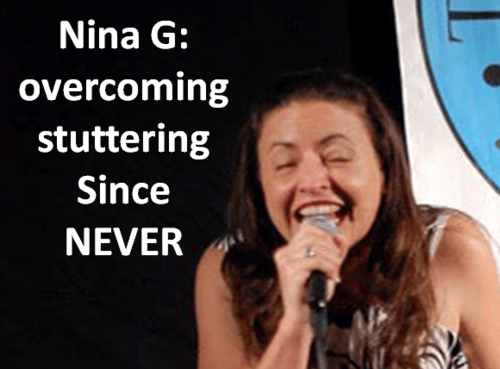
When asked if doing stand-up comedy was particularly challenging because she stutters, Nina demurred. Stand-up comedy is hard for everyone, she told us. But she deals with issues unique to her as a comedian.
For starters, many audience members aren’t sure whether it’s okay to laugh at her (it is). They worry that it’s making fun of Nina’s disability to laugh at her jokes about stuttering (it is not).
Others think Nina fakes her stutter. They literally can’t believe that someone who stutters is a stand-up comedian. Nina’s YouTube page frequently has comments from viewers accusing her of being an impostor.
Finally, Nina could stutter during the punch line of a joke, which would throw off the comedic timing. Jokes generally have a setup, followed by a snappy conclusion called the punchline. If the punchline isn’t delivered with the proper snappy timing (if Nina stutters, for example), it can fall flat even if the joke is well written. To compensate for that, Nina writes her jokes with a particular structure so that the joke will be funny even if the timing on the punch line is slightly off.
Nina has also turned her experiences as someone who stutters into some of her best jokes. A guy she met at a bar who told her to “spit out” her name when she stumbled over it is now the butt of one of her mainstay jokes. When someone asked her why she couldn’t stop stuttering “like that King’s Speech guy,” she worked into her set what parts of the movie were accurate. It’s funny, but also informative.
Nina has embraced the educational aspect of her comedy. She started touring with a group of comedians with disabilities on the “Comedians with Disabilities Act.” They travel around the country and perform in front of much larger audiences than Nina’s typical shows in San Francisco. She’s also started putting on disability training seminars for companies that are a mix of comedy and corporate training. She sells shirts at her shows and recently self-published a children’s book about accommodating disabilities.
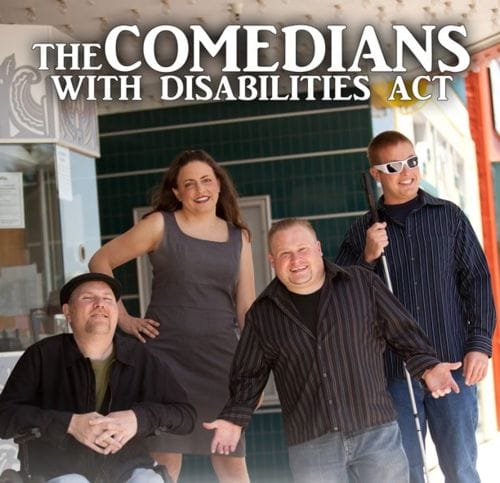
Despite her growing commercial prospects, Nina will make only a few thousand dollars from stand-up comedy this year and still has her day job as a disability advocate. She performs about 25 shows a month, but she only gets paid for one or two of them. Recently she performed in Memphis, Tennessee, and was paid $800 for the show. But she had to pay for her own plane ticket, so she only netted $200. Even when you start getting paid to perform, it’s hard to make money in comedy.
Conclusion
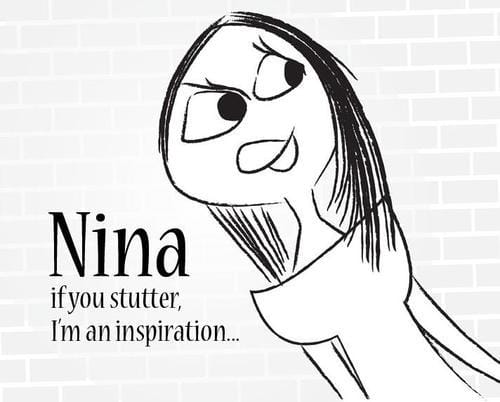
In one of Nina’s sets, she tells the story of a comedy club manager who tells Nina that if she keeps practicing and doing opening mics and getting out there, one day she’ll finally have the self-confidence to stop stuttering.
Nina’s response to the manager crystalizes her story perfectly:
If you get up on stage and you stutter, then maybe self-esteem isn’t your frickin’ issue.
Plus if I stopped stuttering, I wouldn’t have an act. So let’s hope that doesn’t happen.
We all have characteristics that mark us as different. When you’re a kid, that can mean being bullied or told your dreams are out of reach. Even if no one tells us that explicitly, we may get that idea implicitly. Maybe from watching TV and noticing that no one on the screen looks or talks like us. And as a result, we may have regrets later on in life about the things we never tried.
As a child, Nina got the message that she couldn’t become a stand-up comedian because she stuttered. But one day, she decided to ignore that message. She tried stand-up comedy, and she was good at it. She channelled her differences into a unique perspective. While every other comedian makes jokes about male genitalia, Nina makes jokes about male genitalia and social justice. If Nina makes it big as a stand-up comic one day, that “and” will have made all the difference.
This post was written by Rohin Dhar. Follow him on Twitter here or Google. To get occasional notifications when we write blog posts, sign up for our email list.
If you’d like to support Nina G’s comedy career, you can purchase her children’s book about disabilities, Once Upon An Accommodation.




